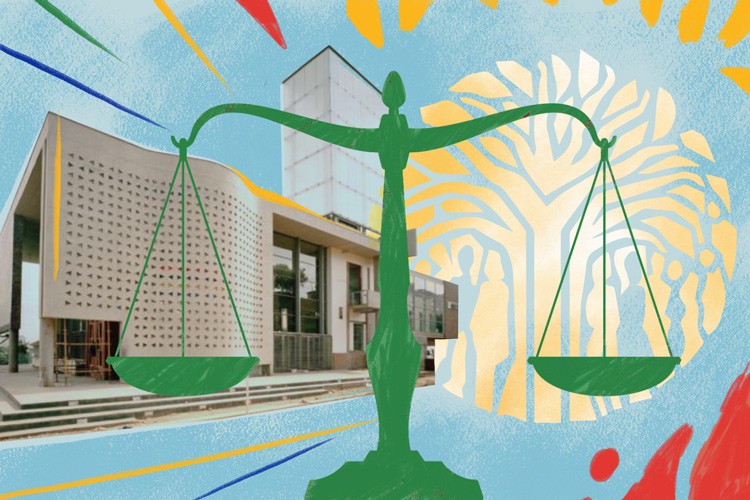Court annuls man’s second marriage because his first wife did not consent
Only the first wife will be allowed to claim from the estate
The Mbombela High Court has annulled a deceased man’s second marriage. Illustration: Lisa Nelson
- A man, now deceased, married his first wife under customary law in 2017 and a second wife in 2020.
- He died two years ago, having never returned to his first wife after the second marriage.
- But the Mbombela High Court has ruled that because the second marriage was not consented to by the first wife, it is invalid.
- Only the first wife may claim from the deceased’s estate.
If someone marries a second wife without the consent of their first customary law wife, is the second marriage valid? The answer is no, according to a recent decision by Deputy Judge President Takalani Ratshibvumo of the Mbombela High Court.
In January 2017, lobola negotiations took place between a man (now deceased) and his first wife, NRM (names were omitted from the judgment). The marriage took place in accordance with Bapedi and Swati customs. The two lived together as husband and wife and had a child together.
But in April 2019, the man met and fell in love with the woman who would become his second wife, FN. He moved in with her and never returned to his first wife.
The new couple concluded both a civil law marriage, in 2020, and a customary law marriage, in 2021. (A civil law marriage in terms of the Marriage Act has different requirements from a customary law marriage under the Recognition of Customary Marriages Act).
The man died in a car accident in February 2023 at the age of 43.
FN was the chief mourner at the funeral and she was listed as his surviving spouse in the obituary.
But NRM filed a court application against FN and the Master of the High Court (who is responsible for winding up deceased estates). She obtained an interim order stopping the deceased man’s pension payments, and applied for the marriage with FN to be declared invalid.
She argued that because she had never divorced her husband and had not consented to the second marriage, the marriage with FN was invalid.
But FN argued that she was unaware of her husband’s first marriage. She argued that in any event, that marriage should be considered to have broken down irretrievably.
An “irretrievable breakdown” is when a marriage no longer functions properly, and it is the legal test for a court to determine whether a divorce order is appropriate.
The deceased man no longer lived with NRM and was only paying maintenance to their child because of a court order, FN said. And, she argued, in Swati and Bapedi customary law, the first wife’s consent is not required.
FN argued that the court should recognise both marriages as valid, meaning that both she and NRM should benefit from his estate on equal terms.
In his judgment, Judge Ratshibvumo said he could not make a finding on whether the marriage with NRM had broken down irretrievably. Such a finding can only be made by a court if a spouse had applied for a divorce order, he said.
Both customary and civil law marriages are always in community of property by default, meaning the spouses share all property equally. In the absence of a divorce order, it would be unfair to disadvantage NRM, Judge Ratshibvumo said.
He found that both marriages were under customary law because they were negotiated and celebrated in terms of traditional African customs – in this case Bapedi and Swati rites. However, because it was common cause that NRM did not consent to the second marriage, he decided that the second marriage (with FN) was invalid.
The civil law marriage between the man and FN was not addressed in the judgment. But polygamy is not allowed in civil law marriages and one cannot be in a civil law marriage with one person and in a customary law marriage with another.
The court considered the Mayelane judgment of the Constitutional Court, which had changed customary law to align with the Bill of Rights, imposing a requirement in customary law marriages that a husband obtain the consent of his first wife before taking any more wives.
The Constitutional Court had reasoned that this development of the law would protect the first wife’s rights to equality, dignity, privacy and autonomy.
In another case, the Pretoria High Court found that a second marriage was lawful even though the first wife did not consent. But Judge Ratshibvumo said the Pretoria High Court had erred, because it had failed to consider the Mayelane judgment.
The second marriage was invalid and unlawful because NRM did not consent to it, Judge Ratshibvumo ruled. He ordered the Master of the High Court to recognise NRM’s marriage to the deceased. She will therefore benefit from his estate. FN was ordered to pay the costs of the application.
Support independent journalism
Donate using Payfast

Don't miss out on the latest news
We respect your privacy, and promise we won't spam you.
Next: Tshwane investigation into illegal suburb raises hopes
Previous: Social housing at Salt River Market moves one step forward
© 2025 GroundUp. This article is licensed under a Creative Commons Attribution-NoDerivatives 4.0 International License.
You may republish this article, so long as you credit the authors and GroundUp, and do not change the text. Please include a link back to the original article.
We put an invisible pixel in the article so that we can count traffic to republishers. All analytics tools are solely on our servers. We do not give our logs to any third party. Logs are deleted after two weeks. We do not use any IP address identifying information except to count regional traffic. We are solely interested in counting hits, not tracking users. If you republish, please do not delete the invisible pixel.

